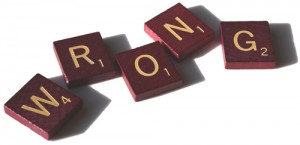Welcome to Purple Pawn, covering games played around the world by billions of people every day.
In the 1930’s Alfred Mosher Butts designed the rules to Lexico. Later renamed to Criss Cross Words, and finally to Srabble, it has sold over one hundred and fifty million sets worldwide. But, new evidence may show that the game, although correct for it’s time, is slowly developing cracks in the modern world.
The key to Butts’ development of his first game (not to be confused by his second and little known other game, ironically entitled “Alfreds Other Game”) was analysis of the English language as a whole. Where better to get straight to the heart of the language than the front page of The New York Times – he thought. So, he analyzed how often each letter was used and, based on the evidence, gave each letter an appropriate score; low scores for letters that occured many times on the front page and high scores for letters that did not. ‘S’ was so overused that he included only 4 of them in the game – far too easy to use.
This was (and has been) the basis for this revolutionary game, its many spawned prize-winning tournaments, and the reason why so many people in the Western world know the word “Qi”.
An American research Joshua Lewis is calling for an overhaul of the values given to letters. “The dictionary of legal words in Scrabble has changed,” he told the BBC, “Among the notable additions are all of these short words which make it easier to play Z, Q and X, so even though Q and Z are the highest value letters in Scrabble, they are now much easier to play.” Lewis has created a program called Valett which recalculates letter scores using a three-fold check mechanism. His recommendations (amongst others) are that X should be devalued from 8 to 5 points, and Z increased from 5 to 6. Such changes could mean the difference between winning and losing.
Europe’s scrabble manufacturer Mattel has declined the change, calling Scrabble a “[…] game of luck […]” and insisting that changing the values wouldn’t change a thing.
No Comments
Sorry, the comment form is closed at this time.
Trending
- Home
- Sequence Game, and Variants
- Why Do Some Board Games Have ISBNs?
- Are Board Games Dangerous?
- Top 25 Board and Card Games on Facebook
- Oh the Irony—Illuminati Card Game Continues to Inspire Conspiracy Theorists
- Karma Chakra, a Buddhist Board Game
- ASLingo, Play Bingo and Learn Sign Language
- Pass It, the Dental Hygienist Study Game
- Star Trek 50th Anniversary Tridimensional Chess Set
Archives
Most Popular Articles
- The 20 Most Valuable Vintage Board Games
- Sequence Game, and Variants
- USPS Adds Board Game Flat Rate Box
- Baila, the Estonian Drinking Card Game
- The 13 Most Popular Dice Games
- The Truth About Dominoes On Sunday in Alabama
- Oh the Irony—Illuminati Card Game Continues to Inspire Conspiracy Theorists
- The Convoluted Story of Iron Wind Metals, Ral Partha, and Battletech Miniatures
- Are Board Games Dangerous?
- Guess Who? The Naked Version
Recent Posts
- Toy Fair 2019—Breaking Games
- Talisman Kingdom Hearts Edition
- Toy Fair 2019—Winning Moves
- Toy Fair 2019—Games Workshop
- Toy Fair 2019—Star Wars Lightsaber Academy
- Toy Fair 2019—Stranger Things Games
- Toy Fair 2019—HABA
- Licensing Roundup
- Game Bandit
- 2018 A Difficult Year For Hasbro But Not For D&D Or MtG
Recent Comments
- on Toy Fair 2019—Winning Moves
- on Game Bandit
- on Second Look—Dungeons & Dragons Waterdeep Dragon Heist
- on Crowdfunding Highlights
- on Beyblade SlingShock
- on Game Bandit
- on Game Bandit
- on Watch This Game!, the Board Game Review Board Game
- on Second Look—Vampire: The Masquerade 5th Edition
- on Palladium Books Loses Robotech IP License, Cancels Five-Year-Overdue Robotech RPG Tactics Kickstarter





